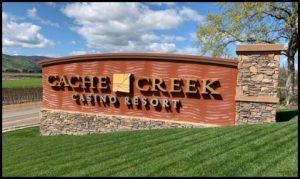In California and a trio of casino-operating tribes have reportedly lost a legal fight against the western state concerning who should be permitted to offer ‘house-banked’ card games such as blackjack and baccarat.
Compact claims:
According to a Thursday report from CalvinAyre.com, the Sycuan Band of the Kumeyaay Nation, the Viejas Band of Kumeyaay Indians and the Yocha Dehe Wintun Nation filed suit against the state of California and Governor Gavin Newsom in January amid claims that their gaming compacts had been violated due to the fact that commercial casinos are now offering card games where competitors play against the house rather than each other.
Banked business:
The tribes had reportedly argued that their gaming compacts, which had been negotiated in 2015 and 2016, contain provisions that give them the exclusive rights to offer ‘house-banked’ games. But, their federal suit contended that this restriction was subsequently violated after the California Bureau of Gambling Control released new card room guidelines that had created a ‘rotating house’ role that allowed each player to take turns serving as the dealer.
Dealer difficulties:
Although this new state of affairs would seem to be in line  with the previously-arranged exclusivity conditions, CalvinAyre.com reported that the federally-recognized tribes alleged that this rotation rule is often skirted by commercial venues making use of a ‘third-party proposition player’. It detailed that this person is usually employed by a private company to act as the dealer as standard competitors routinely decline the offer to serve as the house.
with the previously-arranged exclusivity conditions, CalvinAyre.com reported that the federally-recognized tribes alleged that this rotation rule is often skirted by commercial venues making use of a ‘third-party proposition player’. It detailed that this person is usually employed by a private company to act as the dealer as standard competitors routinely decline the offer to serve as the house.
Tribal request:
The Yocha Dehe Wintun Nation runs the Cache Creek Casino Resort just north of the city of Sacramento while the Viejas Band of Kumeyaay Indians and the Sycuan Band of the Kumeyaay Nation are responsible for San Diego County’s Viejas Casino and Resort and Sycuan Casino Resort respectively. Their suit was reportedly filed with the United States Court of Appeals for the Ninth Circuit in San Francisco and had sought an immediate injunction against commercial casinos being able to offer ‘house-banked’ games.
Exclusivity exemptions:
However, Judge John Menendez reportedly dismissed the lawsuit on Tuesday by explaining that the tribes’ compacts do not feature the same exclusivity provisions as contained within similar arrangements inked in 1999. As such, he ruled that the trio can only expect the exclusivity that had been granted to them under the provisions of the state’s constitution.
Commercial commendation:
In praising the court’s decision, Kyle Kirkland from the  California Gaming Association (CGA) used an official Wednesday press release to describe the tribe’s lawsuit as ‘an attempt to eliminate competition from local card rooms’. He additionally claimed that the legal action had threatened ‘thousands of California families and dozens of communities statewide’ and that his organization, which represents the interests of the state’s commercial gaming operators, would ‘continue to oppose specious tribal attacks on our industry, employees and communities’.
California Gaming Association (CGA) used an official Wednesday press release to describe the tribe’s lawsuit as ‘an attempt to eliminate competition from local card rooms’. He additionally claimed that the legal action had threatened ‘thousands of California families and dozens of communities statewide’ and that his organization, which represents the interests of the state’s commercial gaming operators, would ‘continue to oppose specious tribal attacks on our industry, employees and communities’.
Kirkland’s statement read…
“We are pleased that the court dismissed this lawsuit by these California tribes against the state of California over alleged violations of their tribal gaming compacts. The federal court ruled that the compacts do not give the tribes exclusivity over gaming in California. We will not stand by quietly while wealthy tribes try to misuse court resources to hurt our employees, their families and our communities.”



